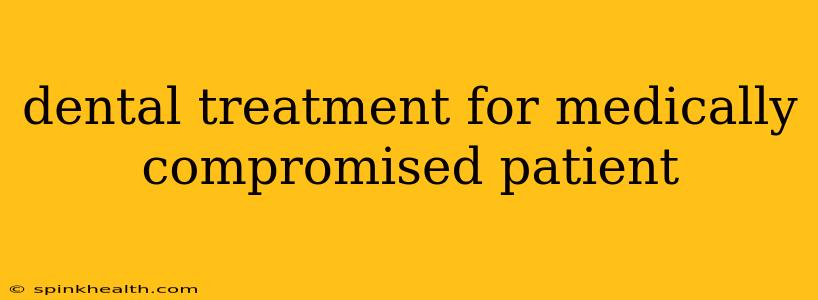The whirring of the drill, the antiseptic smell – for most, a dental appointment is a routine matter. But for individuals with underlying medical conditions, a simple checkup can transform into a complex, even risky, undertaking. This isn't to say that dental care should be avoided; rather, it requires a significantly more nuanced and cautious approach. This article explores the unique considerations and challenges of providing dental treatment for medically compromised patients. My name is Dr. Evelyn Reed, and I've dedicated my career to this specialized field. Let's delve into the intricacies of ensuring safe and effective dental care for this vulnerable population.
What Makes a Patient "Medically Compromised"?
Before we discuss treatments, it's crucial to understand who we're talking about. A medically compromised patient is anyone with a chronic illness, a significant medical history, or conditions that could complicate dental procedures. This broad category encompasses a vast range of individuals, including those with:
- Cardiovascular disease: Heart conditions, high blood pressure, and artificial heart valves necessitate careful consideration of anesthesia and infection control.
- Respiratory conditions: Asthma, COPD, and cystic fibrosis require careful management of oxygen levels and potential airway complications during procedures.
- Diabetes: Diabetics are at increased risk of infection and slow healing, demanding meticulous infection control and post-operative care.
- Kidney disease: Patients with kidney problems might require adjustments to medications and anesthetic choices.
- Immunodeficiency: Individuals with weakened immune systems, including those undergoing chemotherapy or with HIV/AIDS, are highly susceptible to infection, requiring stringent sterilization protocols.
- Bleeding disorders: Hemophilia and other bleeding disorders demand special precautions to minimize bleeding risks during procedures.
What Dental Procedures Are Safe for Medically Compromised Patients?
The safety and suitability of any dental procedure depend entirely on the patient's specific medical condition and overall health. Many standard procedures can be performed safely with proper planning and precautions. However, some require more careful consideration and may involve a collaborative effort between the dentist and the patient's physician.
How Does Medical History Impact Dental Treatment?
A thorough medical history is paramount before any dental treatment begins. This allows the dentist to assess potential risks and implement necessary precautions. This often involves:
- Reviewing medications: Certain medications can interact with anesthetics or impact healing.
- Assessing current health status: Acute infections or unstable medical conditions often necessitate postponing elective dental work.
- Consulting with the patient's physician: This ensures a coordinated approach, minimizing risks and optimizing outcomes.
What Anesthesia Options Are Available?
The choice of anesthesia is crucial, particularly for patients with cardiovascular or respiratory conditions. Options might include:
- Local anesthesia: This is often the safest and most preferred method for many procedures.
- Sedation: Conscious sedation can reduce anxiety and discomfort, but it requires careful monitoring.
- General anesthesia: This is typically reserved for complex or extensive procedures and only used in controlled settings with appropriate medical supervision.
What About Infection Control?
Infection control is paramount for all patients, but it's critically important for those with compromised immune systems. Strict sterilization protocols and meticulous hygiene practices are essential to minimize the risk of infection.
How Can I Find a Dentist Experienced with Medically Compromised Patients?
Finding a dentist with experience in this area is crucial. Many dentists specialize in treating medically compromised patients, and many hospitals also have dedicated dental clinics for this purpose. Contacting your physician for recommendations can be incredibly helpful.
What are the Potential Complications?
While rare with proper care, potential complications can include:
- Infections: This is a significant risk for patients with weakened immune systems.
- Adverse reactions to anesthesia: This can range from mild discomfort to life-threatening events.
- Bleeding: Excessive bleeding can occur in patients with bleeding disorders.
- Slow healing: This is common in patients with diabetes or other underlying conditions.
Navigating dental care as a medically compromised patient can be daunting. But with careful planning, open communication with your dentist and physician, and a collaborative approach, safe and effective dental treatment is achievable. Remember, your oral health is essential to your overall well-being, and seeking appropriate care is a vital step in maintaining both. It’s important to find a dental professional who understands and values your unique needs.

